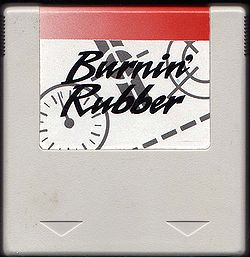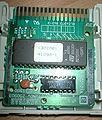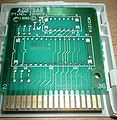Difference between revisions of "GX4000 cartridge"
(→Technical specs.) |
(→EPROMs) |
||
| Line 18: | Line 18: | ||
27C4001 32 512K LK6 (A15=A15=Address) LK3 (A17=A17=Address) LK2 (A18=A18=Address) | 27C4001 32 512K LK6 (A15=A15=Address) LK3 (A17=A17=Address) LK2 (A18=A18=Address) | ||
Some cartridge PCBs don't have any LKs installed, instead, the etched circuit has hardwired connections between some of them. One could scratch them off, and then use the LK soldering points to reconfigure the board for eproms of other size. | Some cartridge PCBs don't have any LKs installed, instead, the etched circuit has hardwired connections between some of them. One could scratch them off, and then use the LK soldering points to reconfigure the board for eproms of other size. | ||
| + | |||
| + | == Protection == | ||
| + | |||
| + | The EPROMs aren't encrypted, making it very easy to dump their content, or to replace them by other EPROMs. However, all (system and game) cartridges must contain an ACID chip, otherwise the CPC+/GX4000 refuses to work. | ||
| + | |||
| + | * For details, on the chip see [[ACID]]. | ||
| + | |||
| + | All game cartridges (and the system cartridge shipped with the 464+/6128+) include an ACID chip, so, with with limited soldering skills, it's extremely easy to reuse that chip with other EPROMs. So, the protection doesn't prevent piracy or homebrew programming. It's only preventing commercially produced unlicensed games (which are more than unlikely to be sold with instructions saying to "de-solder your ACID chip before using this game"). | ||
== Misc == | == Misc == | ||
Revision as of 05:33, 20 February 2010
A cartridge system was introduced with the launch of the CPC+ series. This enabled developers to distribute games via cartridges on the new Amstrad. The cartridges are protected with the ACID chip.
EPROMs
All known manufactured cartridges contain EPROMs (rather than PROMs or ROMs). The cartridges can be fitted with different EPROMs in range of 32K through 512K (actually produced are only 128K..256K). The cartridge PCBs typically include six LK Links to match the PCB to the EPROM pin-outs:
VCC ---LK1--- EPROM.A18 ---LK2--- CA18 VCC ---LK3--- EPROM.A17 ---LK4--- CA17 VCC ---LK5--- EPROM.A15 ---LK6--- CA15
Usually the following LKs should be installed:
(----- EPROM -----) (------------------------ Links installed -------------------------) Type Pins Size A15 A17 A18 27C256 28 32K LK5 (A15=VCC=High) LK4 (A17=VCC=Supply) N/A 27C512 28 64K LK6 (A15=A15=Address) LK4 (A17=VCC=Supply) N/A 27C1001 32 128K LK6 (A15=A15=Address) N/A LK1 (A18=VCC=/PGM) 27C2001 32 256K LK6 (A15=A15=Address) LK3 (A17=A17=Address) LK1 (A18=VCC=/PGM) 27C4001 32 512K LK6 (A15=A15=Address) LK3 (A17=A17=Address) LK2 (A18=A18=Address)
Some cartridge PCBs don't have any LKs installed, instead, the etched circuit has hardwired connections between some of them. One could scratch them off, and then use the LK soldering points to reconfigure the board for eproms of other size.
Protection
The EPROMs aren't encrypted, making it very easy to dump their content, or to replace them by other EPROMs. However, all (system and game) cartridges must contain an ACID chip, otherwise the CPC+/GX4000 refuses to work.
- For details, on the chip see ACID.
All game cartridges (and the system cartridge shipped with the 464+/6128+) include an ACID chip, so, with with limited soldering skills, it's extremely easy to reuse that chip with other EPROMs. So, the protection doesn't prevent piracy or homebrew programming. It's only preventing commercially produced unlicensed games (which are more than unlikely to be sold with instructions saying to "de-solder your ACID chip before using this game").
Misc
RAM7, a French hardware developer, created a device to hack CPC Plus cartridges.
Pictures
- GX4000 cartridges
Demonstration System
Amstrad released a Demonstration system for his retailer in order to show GX4000 games: the Amstrad CSD.
It was a 464plus motherboard, with an extra "daughter board) allowing the insertion of 12 games cartridges, plus an extra special cartridge acting as an OS.
- Some photos of Amstrad Expo 90
Courtesy of Amstrad.cpc.free.fr
Link to the French article on the matter






